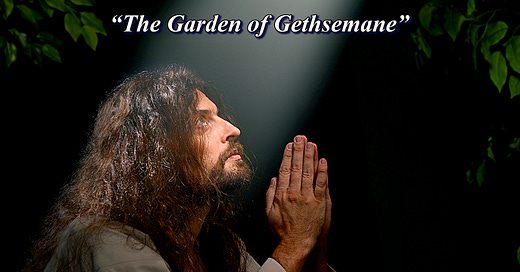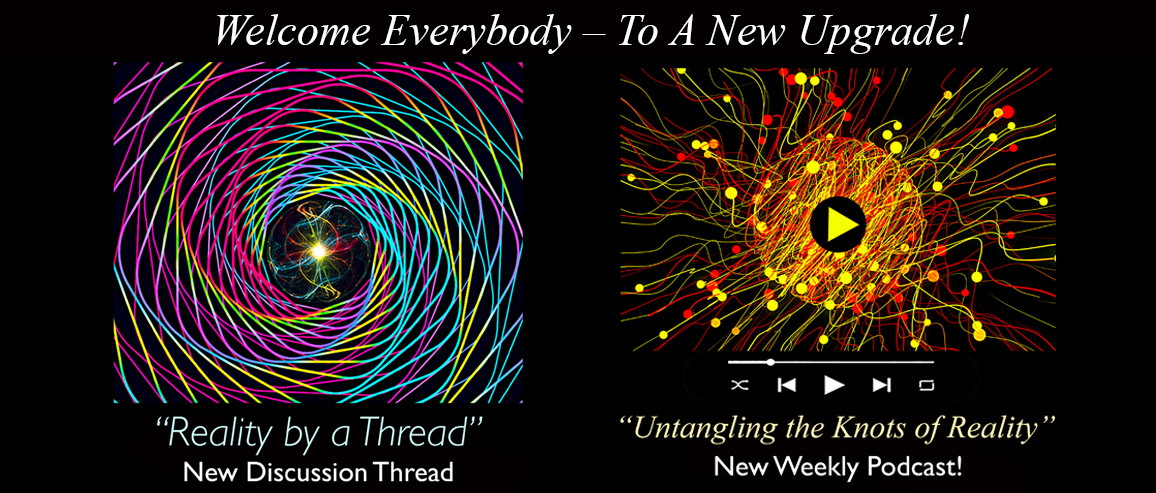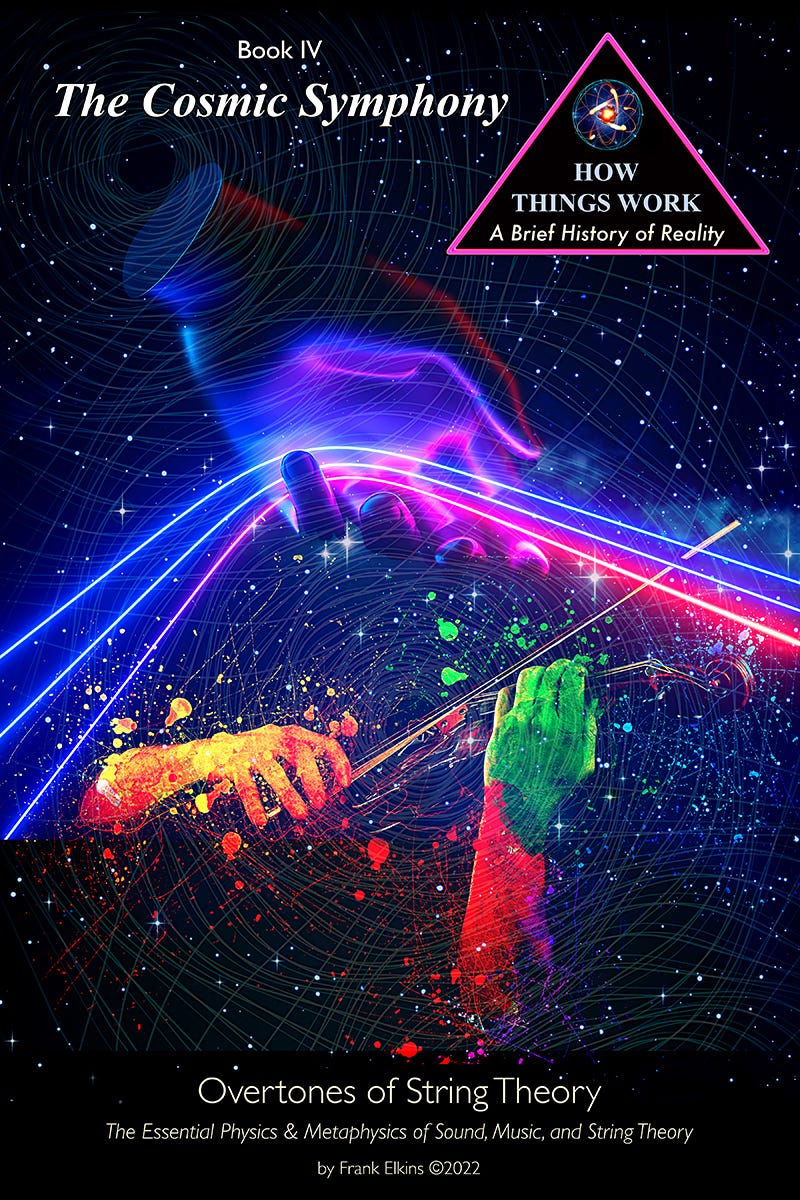"The Garden of Gethsemane"
How Things Work – Consideration #121 (Book II Science & Religion)
Be A Part of the Conversation!
Tuesday February 6, 2024
“In Gethsemane the holiest of all petitioners prayed three times that a certain cup might pass from Him. It did not.”
– C. S. Lewis
PREFACE
Welcome Everybody!
The two most important holy days in Christianity are Christmas and Easter. Christmas celebrates the birth of the “messiah” Jesus. Easter celebrates his death and resurrection. However, if not for the choice made in the Garden of Gethsemane neither of these holidays would be celebrated, or even exist.
The Garden of Gethsemane represents the resolution to the Biblical narrative. There is no Christianity, or spiritual redemption, without it. It is the final “turning point” in the narrative, making the resolution of resurrection and eternal life in the Kingdom of Heaven possible.
“…Jesus faces the most difficult part about being human: choice and free will.”
In the Garden of Gethsemane, Jesus faces the most difficult part about being human: choice and free will. The same choice as originally faced by Adam and Eve. However, the false choice offered by the serpent promised a positive, even enlightening, new experience of “the world.” Whereas the real choice facing Jesus promised only pain, suffering, and death. What is critically important to remember is that Jesus had a choice; in the Garden of Gethsemane, he voluntarily manifests it.
CONSIDERATION #121 – The Garden of Gethsemane
Despite abandonment and betrayal, Jesus would demonstrate the essence of a pure heart, forgiveness. However, the reality of what was about to happen was impossible for Jesus to ignore. His real test was about to begin. In the Garden of Gethsemane, the fear of the future takes hold of Jesus, so he asks his disciples to “keep watch” with him. Jesus is afraid, and fears to be alone.
“Sit here while I go over there and pray.” He took Peter and the two sons of Zebedee along with him, and he began to be sorrowful and troubled. Then he said to them, “My soul is overwhelmed with sorrow to the point of death. Stay here and keep watch with me.”
Going a little farther, he fell with his face to the ground and prayed, “My Father, if it is possible, may this cup be taken from me. Yet not as I will, but as you will.”
Then he returned to his disciples and found them sleeping. “Couldn’t you men keep watch with me for one hour?” he asked Peter. “Watch and pray so that you will not fall into temptation. The spirit is willing, but the flesh is weak.”
Matthew 26:36-41
Jesus prays the same prayer twice more, each time finding the Apostles asleep when he returns. After the third attempt at trying to get God to change His mind, the reality of the inevitable sets in and Jesus prepares himself for what is about to take place.
“Are you still sleeping and resting? Look, the hour has come, and the Son of Man is delivered into the hands of sinners. Rise! Let us go! Here comes my betrayer!”
Matthew 26:45-46
As Jesus is speaking these words, Judas arrives and kisses him, which is the sign Judas uses to point him out to the authorities.
While he was still speaking, Judas, one of the Twelve, arrived. With him was a large crowd armed with swords and clubs, sent from the chief priests and the elders of the people. Now the betrayer had arranged a signal with them: “The one I kiss is the man; arrest him.” Going at once to Jesus, Judas said, “Greetings, Rabbi!” and kissed him.
Jesus replied, “Do what you came for, friend.”
Matthew 26:47-50
However, even knowing what is about to occur, Jesus finds an opportunity for one last lesson.
Then the men stepped forward, seized Jesus and arrested him. With that, one of Jesus’ companions reached for his sword, drew it out and struck the servant of the high priest, cutting off his ear.
“Put your sword back in its place,” Jesus said to him, “for all who draw the sword will die by the sword. Do you think I cannot call on my Father, and he will at once put at my disposal more than twelve legions of angels? But how then would the Scriptures be fulfilled that say it must happen in this way?”
In that hour Jesus said to the crowd, “Am I leading a rebellion, that you have come out with swords and clubs to capture me? Every day I sat in the temple courts teaching, and you did not arrest me. But this has all taken place that the writings of the prophets might be fulfilled.” Then all the disciples deserted him and fled.
Matthew 26:50-56
Jesus was taken to the Sanhedrin, a council of elders led by the high priest Caiaphas. Peter followed them. They were looking for a reason to put Jesus to death. Two men came forward saying that Jesus claimed he could destroy the Temple and then rebuild it in three days; misinterpreting the metaphor and prophecy Jesus was making. The Temple Jesus was referring to was himself. He would be killed, buried, and resurrected on the third day. However, this was the excuse they were looking for.
Finally two came forward and declared, “This fellow said, ‘I am able to destroy the temple of God and rebuild it in three days.’”
Then the high priest stood up and said to Jesus, “Are you not going to answer? What is this testimony that these men are bringing against you?” But Jesus remained silent.
The high priest said to him, “I charge you under oath by the living God: Tell us if you are the Messiah, the Son of God.”
“You have said so,” Jesus replied. “But I say to all of you: From now on you will see the Son of Man sitting at the right hand of the Mighty One and coming on the clouds of heaven.”
Then the high priest tore his clothes and said, “He has spoken blasphemy! Why do we need any more witnesses? Look, now you have heard the blasphemy. What do you think?”
“He is worthy of death,” they answered.
Then they spit in his face and struck him with their fists. Others slapped him and said, “Prophesy to us, Messiah. Who hit you?”
Matthew 26:61-68
The disciples had abandoned him, and the crowd had turned against him. Only days earlier the entire city was cheering his name. Now, as the rooster welcomed the morning sun, Peter denounced his beloved Lord for the third time. Jesus was completely alone. Even God would no longer help him.
The choice had been made.
POSTSCRIPT
The time had come. The apostles were asleep. Jesus was alone. Soon, it would be too late to turn back. The truth of what was about to take place had seized Jesus. The final consequence of his choice was now about to actually unfold. Faced with the bleak reality before him, he questioned whether there might be another possibility. Another choice.
In the rock opera Jesus Christ Superstar by Andrew Lloyd Webber and Tim Rice, this fragile moment in the Garden of Gethsemane marks the climax of their story. Jesus, left alone with a choice. Desperately praying for another option.
“Gethsemane”
I only want to say…
If there is a way?
Take this cup away from me;
for I don't want to taste its poison.
Feel it burn me, I have changed…
I'm not as sure as when we started.
Then I was inspired…
Now I'm sad and tired.
Listen, surely I've exceeded expectations?
Tried for three years, seems like thirty!
Could you ask as much from any other man?But if I die…
See the saga through and do the things you ask of me!
Let them hate me, hit me, hurt me, nail me to their tree…Can you show me now that I would not be killed in vain?
Show me just a little of your omnipresent brain?
Show me there's a reason for your wanting me to die!
You're far too keen on 'where' and 'how' and not so hot on 'why'…
Then I was inspired…
Now, I'm sad and tired.
After all I've tried for three years –
Seems like ninety…Why, then, am I scared to finish what I started?
What you started… I didn't start it!
God, thy will is hard!
But you hold every card.
I will drink your cup of poison;
nail me to your cross and break me.
Bleed me, beat me, kill me, take me now…
Before I change my mind!Excerpt from “Gethsemane” (Jesus Christ Superstar – Lyrics by Tim Rice)
In the end, Jesus, like all human beings, makes his choice; and chooses to follow the will of God.
Next week Jesus is found guilty under Jewish and Roman law…
This Week on “The Thread”…
Excerpt From This Week’s Podcast:
Expand the Conversation by Upgrading to “Reality by a Thread!”
• UNTANGLING THE KNOTS OF REALITY: PODCAST #81 – “Untangling Inalienable and Civil Rights ”
(“What is the distinction between Inalienable Rights and Civil Rights?” “Why are Inalienable Rights considered Natural Rights?” “What distinguishes an Inalienable Right from a Civil Right?” “How do Civil Rights reflect the Social Contract?” “Is Health Care a Human Right or a Civil Right?” These are some of the knots we will attempt to untangle in this week’s podcast. That’s a lot of Inalienable and Civil Rights for one podcast! So, let’s get started…)
• REALITY BY A THREAD: UNCONSCIOUS SUPER ARTIFICIAL INTELLIGENCE – PART ONE (Excerpt) – “Hunt suggests that this rapid acceleration will very soon result in what he calls ‘artificial general intelligence’ (AGI) which will enable it to teach and improve itself with no human intervention necessary. According to Hunt, researchers currently analyzing Open AI’s GPT-4 said that it had, ‘sparks of advanced general intelligence’ already.”
•FREE PDF Downloads of Book IV: “The Cosmic Symphony – Overtones of String Theory” plus other Free Books, Discounts and Benefits. Also Gain Complete Access to all Previous Podcasts and Threads!
UPGRADE NOW!
Book V Now Available!
“All Possibility is manifested from Potential Being (Rationalism). Example: You decide to build a house. Once that decision is made, the house moves toward potentiality in the empirical world. The idea, or potential house, will eventually become a ‘real’ house in ‘physical reality.’ It moves from a state of Potential Being (abstract idea) to a state of Physical Being as a ‘real house’ that you live in. Physical Being is a direct consequence of Potential Being.” – Book V (Quantum Consciousness)
Click Image to Learn More!
Book V considers the questions related to what Consciousness is, how it evolves through levels of Perception and Awareness, why each step in the process is important, where we are currently on the “Arch of Consciousness,” and how all of this connects to Artificial Intelligence. (166 pages)
What is String Theory and Where Did It Come From?
Book IV – The Cosmic Symphony!
“Music represented much more than just pleasant sounds to our ears; it directly reflected the mathematical perfection of the universe. The entire universe was in tune, generating itself through unheard vibrations creating a Cosmic Symphony…” (Book IV – The Cosmic Symphony)
Click Image to Learn More!
“Pythagoras called this Cosmic Symphony of Abstract Perfection ‘The Music of the Spheres.’ This marked the beginning of a very long journey into the nature of a Reality that reflected an experience based purely on mathematical vibrations.” Book IV – The Cosmic Symphony (210 pages)







